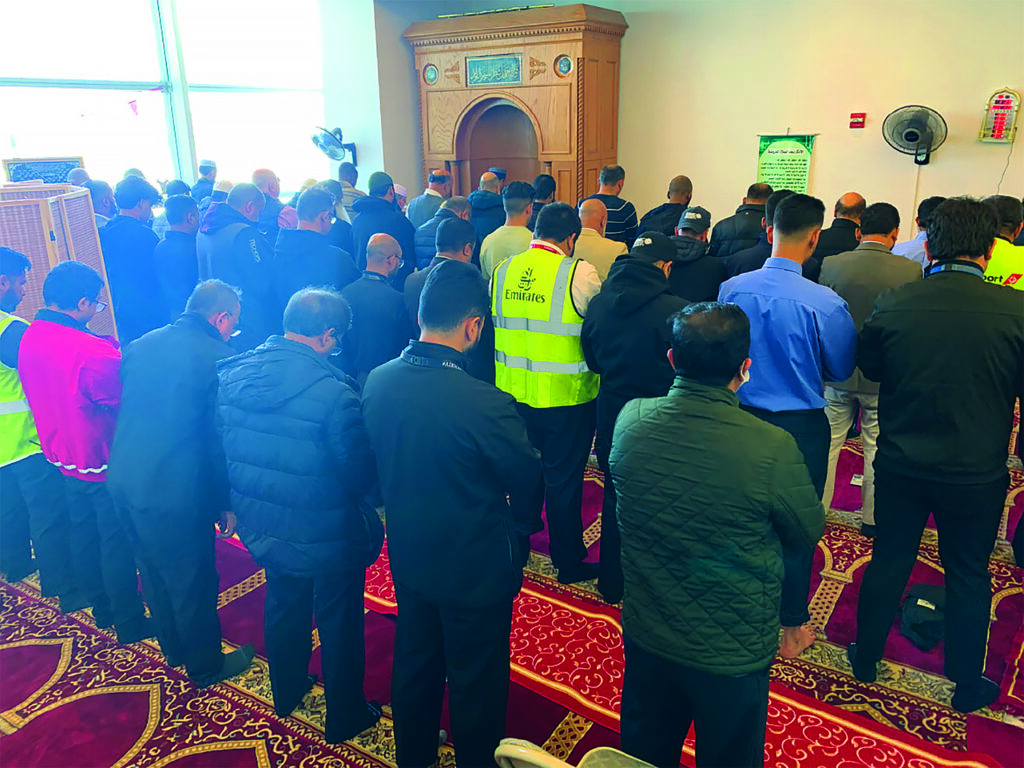As More Muslims Join the Airport’s Workforce, Existing Prayer Spaces Become Cramped and Inadequate
By Misbahuddin Mirza
Nov/Dec 2024

As the sun struggles to rise over a slumbering New York City, Bibi Khan, a Guyanese American Muslim, arrives for work and walks deftly toward JFK International Airport’s Terminal 4. It’s Ramadan, and she has just started her fast. Entering the brightly lit terminal, she passes the donut store, takes the elevator to the fourth floor, walks past the seemingly unending rows of airline counters with background walls of brilliant display screens using the latest nanolumens technology and finally makes a sharp left just before the TSA security check-in.
Here, in the small multi-faith chapel, are rows of prayer mats laid out facing the qibla. She offers her fajr prayer and then heads to work at Delta Airlines’ security, where she has been employed for over five years. “This mosque is a blessing for me. If this wasn’t here, I wouldn’t be able to offer my daily mandatory prayers,” said Khan.
Terminal 1 also has a small prayer space set aside for Muslims.
Imam Essam Mahmoud, a Cairo native who leads prayer services, is part of the four-member JFK Masjid Board. Mahmoud, who has an undergraduate degree in accounting and a master’s degree in hotel management, has worked for 15 years as a load controller in Swissport, Egypt Air, Kuwait Airlines and Caribbean Airlines. During Ramadan, a few Muslim airport employees sponsor a daily iftar which is open to Muslims and non-Muslims alike.
Four prayer rooms are set aside in Terminal 4 for Catholics (Joseph, Father Cezariusz Jastrzębski), Protestants (Rev. Romeo K. Dabee), Jews (Rabbi Dr. Ari Korenblit) and all other faiths, respectively. The first three chapels are always deserted. Father Cezariusz’s weekly congregation sometimes manages to get up to five attendees. But record Muslim attendance has made the fourth chapel burst at its seams.
A 2015 TIME Magazine article stated, “The JFK International Islamic Center is part of a larger chapels area at JFK’s Terminal 4, which was built in 1955 to house a general Christian place of worship. It was remodeled in 1966 to include Catholic, Protestant and Jewish prayer spaces, and in 2001 a separate multi faith room was built to meet rising demand for a prayer space for the terminal’s Muslim, Hindu and Sikh travelers and workers, nearly a decade after the United American Muslim Association first proposed the idea. Services were intermittent and run by volunteers at first, but when [Ahmet] Yuceturk joined as the prayer space’s first full-time imam in 2008, the room became a full-fledged mosque. Since then, attendance has risen steadily, with Muslim airport workers spreading the word”
Muslims Outgrow the Space
A lot has changed in the intervening nine years. The weekly jummah prayers see a huge congregation exceeding 150 people. You see Muslim airport workers walking briskly to the Terminal 4 mosque. The mosque operates inside the approximately 25 ft. x 25 ft. multi faith room. The airport’s Muslim workforce has now grown to a point where the worshipers can barely fit in this space. The flexible wooden divider between men and women has to be shortened on Fridays, thus cramming the women into an even smaller space. It’s said that during Ramadan, the congregants overflow into the adjacent corridor.
The diverse array of Muslims congregating for Friday prayers is simply amazing. M. Aminul Islam, a Bangladeshi American, has worked with Smarte Carte – a company that rents luggage carts to travelers – for two and a half years. Mohammad Mridha Jasim, another Bangladeshi American Muslim, assists travelers with disabilities. Muslim airport employees of various ethnic backgrounds stand shoulder to shoulder, united in acknowledging the Creator’s sovereignty and unity.
The Muslim worshippers have some concerns and comments about some of the hardships they face. For example, they’ve pointed out that they have to compete for scarce space with several other religions’ worshippers whose loud music interferes and disturbs their prayer services, while the three seldom-used neighboring chapels stand empty. They also feel the need for a dedicated bathroom with a foot washing sink for their pre-prayer ablutions, that commuting to the mosques in either Terminal 4 or Terminal 1 is sometimes quite difficult due to the schedule of AirTrain (the shuttle between terminals) and the associated walking time during their limited lunch break.
Given the acute insufficiency of prayer space, they would like a larger area to meet the growing community’s needs, or at least on par with that allotted to the Christians and Jews. As an interim measure, they suggested granting permission for temporary use of those three chapels during the peak times of Friday afternoon and during Ramadan.
The Port Authority of New York and New Jersey is currently spending a massive $18 billion on building new terminals and upgrading other airport facilities. Hopefully they will have the heart to listen and cater to the needs of its Muslim airport employees by providing a spacious dedicated mosque with a bathroom in each JFK terminal.
Misbahuddin Mirza, M.S., P.E., is a licensed professional engineer, registered in the States of New York and New Jersey. He served as the regional quality control engineer for the New York State Department of Transportation’s New York City Region. He is the author of the iBook “Illustrated Muslim Travel Guide to Jerusalem.” He has written for major U.S. and Indian publications.
